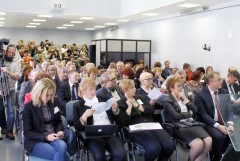2015. Social media in various socio-political contexts
June 08, 2022
International Conference “Comparative media studies in today’s world: Social media in various socio-political contexts”
Working language: English, with simultaneous translation into Russian
April 25, 2015

This year, the Third international conference ‘Comparative media studies in today’s world’ held annually in St.Petersburg, Russia, brings together the papers oriented to research upon online/offline communication cleavages, communication on social issues in online networks, inter-media agenda setting and other aspects that unite online communication and wider socio-political life.
The study of social media and their implications on the processes of social transformations is gaining growing importance within today’s media research, with big attention being paid to critical evaluation of the role of social media for social and political change and for the development of civil society. The study of ‘network societies’ today already goes beyond studying online/social media and their audiences, but relates Internet communicative milieus to the wider societal structures and political processes.
While Internet research today is focusing more on how online communication itself and its impact upon selected political, economic and cultural aspects of social life, media studies have developed several other discourses looking at the same communication phenomena but not yet very much connected to Internet-oriented studies. Among those, comparative media research and media hybridization research may be named; these areas, like some others, contribute to bringing us (Western and Eastern Europe in particular) closer to understanding of the interdependences between media and political systems and the process of technological and political hybridization of media systems in various contexts.
General topics and questions for discussions
Theoretical approaches to comparative studies of hybrid media systems;
Social media in the context of today’s comparative research;
Methodology of social media research;
Inter-media agenda setting and agenda flows;
Online/offline media parallelism and the online public sphere(s);
Social media and political mobilization in various societies;
The role of social media in fostering social change;
Online communication milieus as ‘virtual fireplaces’ and/or ‘echo chambers’.
PROGRAM
LOCATION:
Room 603, 1 Linia 26, St. Petersburg
REGISTRATION
09.30 – 10.00
OPENING OF THE CONFERENCE
13.15–13.30 Welcome speeches
Prof. Anatoly Puyu, Director of the School of Journalism and Mass Communications, St. Petersburg State University
Dr. Nikita Basov, Scientific Manager of Centre for German and European Studies (St. Petersburg State University–University of Bielefeld, Germany)
PANEL DISCUSSION
13.30–15.00
Methodology of social media and Internet research: criticism and perspectives
Moderator: Sergey Korkonosenko, SPBSU
Michael Meyen, Ludwig Maximilian University of Munich Journalists' autonomy and social media. A media system typology beyond Hallin & Mancini
Josef Seethaler, Maren Beaufort, Austrian Academy of Sciences Putting social media in context: The interconnections between media systems, social media use, and political participation
Susanne Fengler, University of Dortmund/Erich Brost Institute for International Journalism
A participative approach to media accountability: Social media and media self-regulation –results from a comparative study
Ivan Blekanov, St. Petersburg State University, Alexey Maksimov, St.Petersburg State University of Precise Mechanics and Optics
Web crawling methods of analysis of structures for large web segments and social media
15.00 –16.00 Lunch break
16.00 –17.30
Social media in the media systems of today’s Russia and CEE countries
Moderator: Kamilla Nigmatullina, SPSU
Jukka Pietiläinen, University of Helsinki Comparison of Eastern European media models in post-socialist era: How many varieties and why?
Sergey Davydov, Elena Pronkina, National Research University -Higher School of Economics, Moscow Discussion of LGBT-related issues in Russian social networks during the Sochi Olympic games
Olessia Koltsova, Galina Selivanova, Daria Yudenkova, National Research University -Higher School of Economics, St. Petersburg
Online and offline realms of social movements: Case of observers for fair elections in St.Petersburg
Anna Smolyarova, St. Petersburg State University Internet forums of the Russian-speaking migrants as the alternative to ethno-cultural media
No comments yet. Be the first!


